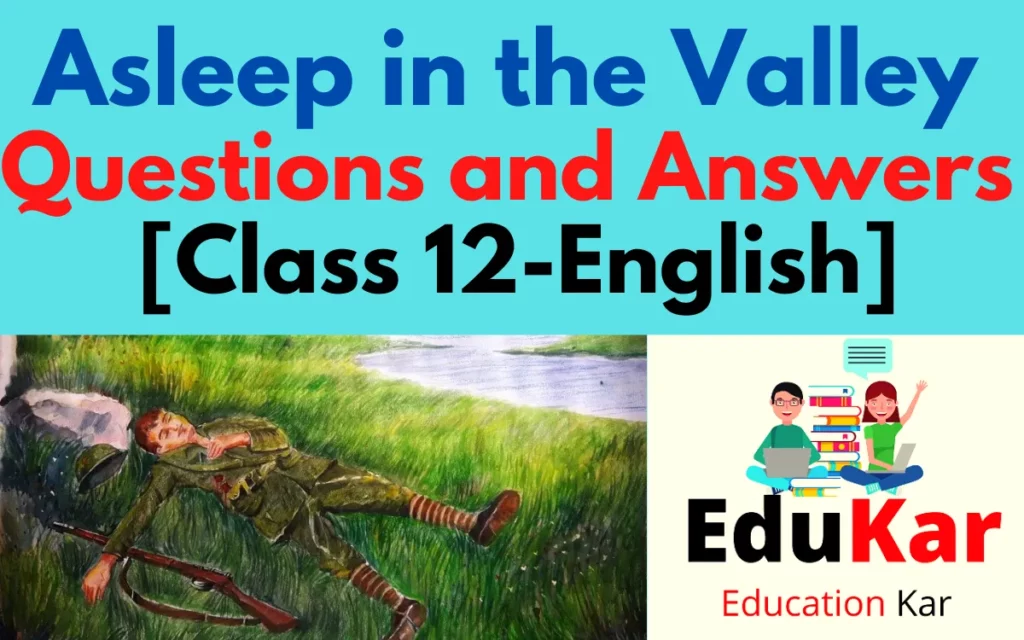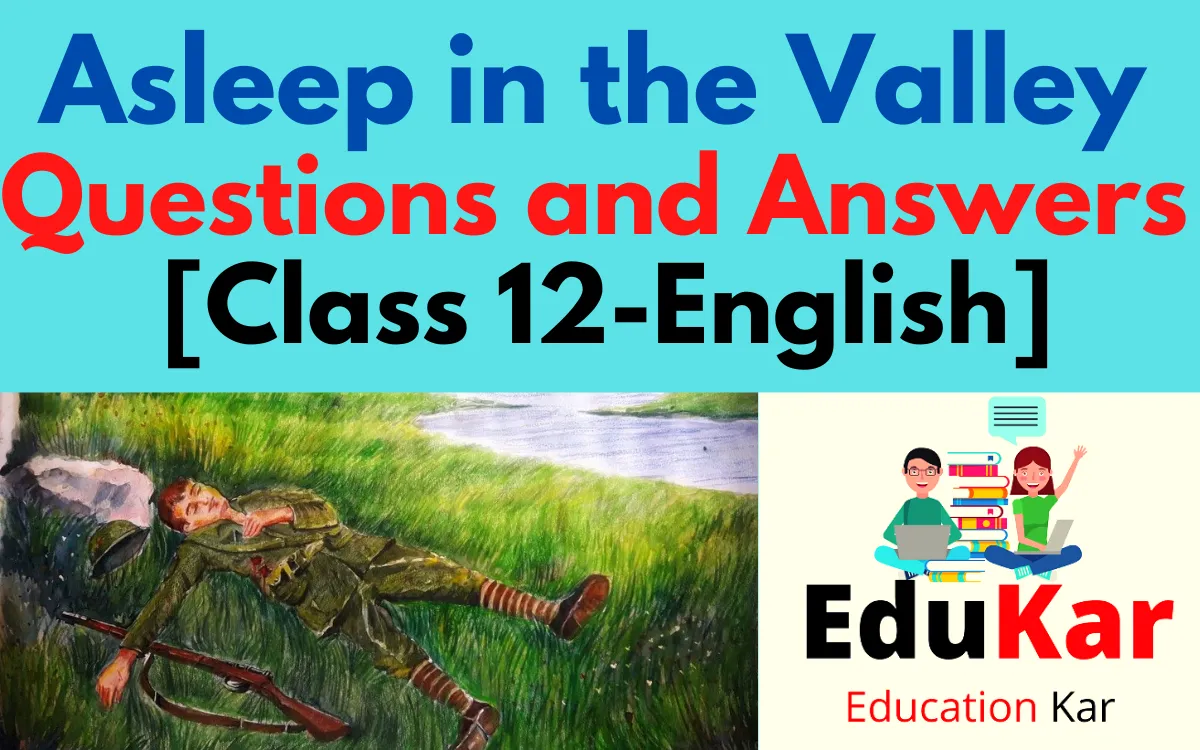| Name | Asleep in the Valley |
| Type | Question Answer |
| Class | 12th |
| Subject | English |
| Board | WB Board |
| Author | Arthur Rimbaud |

Asleep in the Valley Summary
“Asleep in the Valley” is a poem written by Arthur Rimbaud, a French poet known for his unconventional style and use of vivid imagery. The poem is a description of a peaceful, idyllic scene in a valley, where the speaker is resting and enjoying the beauty of nature. The poem is filled with imagery and symbolism that explores the themes of nature, beauty, and the passage of time.
The poem begins with the speaker describing the peacefulness of the valley, where everything is still and quiet. The speaker is lying on the grass, looking up at the sky, and taking in the beauty of the landscape. He describes the valley as a “green valley” with “gentle slopes” and “cool streams.” The speaker also describes the flowers and trees, the birds singing and the sun shining. All these elements create an idyllic and peaceful scene.
The speaker then reflects on the beauty and transience of nature, and how it is constantly changing. He describes how the seasons come and go, how the flowers bloom and fade, and how the birds migrate. The imagery of the changing seasons serves as a reminder of the fleeting nature of beauty and the passage of time.
The poem concludes with the speaker feeling content and at peace, enjoying the beauty of nature, and the simple pleasures of life. The poem is a celebration of nature, its beauty, and its ability to bring peace and tranquility to the mind.
Asleep in the Valley- Long Questions and Answers
Q1: “The humming insides don’t disturb his rest.” Who rests and where? Why is his rest not disturbed by the insects?
Ans: In Arthur Rimbaund’s poem “Asleep in the Valley” the younger soldier is a victim of war rests in a small green valley. The younger soldier lies strtched with a pillow made of fern in the heavy undergrowth. He lies pale in his warm sun-soaked bed with the feet among flowers in a small green valley.
His rest is not disturbed by the humming insects because he is dead. The poet simply describes that the young soldier is sleeping in sunlight with one hand on his breast at peace. But the cruel reality is that the soldier has received fatal wounds of bullets in the side of his body. It has caused hi death. So the humming insects will not be able to wake him by disturbing his rest.
Q2: “His smile/Is like and infant’s”. Whose smile is being referred here? Why is smile compared to the smile of an infants? How does nature take care of him?
Ans: In In Arthur Rimbaund’s poem “Asleep in the Valley”, the smile of a dead young soldier is being referred to.
The dead soldier’s smile is compared to the smile of an infant because he is innocent and virtuous as a child. He is ignorant about the cruelty of war. He is a victim of war. He is as helpless as a child. His innocent smile shows the futility of war.
Nature takes much care of the younger soldier. Mother prepares a warm sun-soaked bed with the pillow made of fern for the younger soldier. He will not catch cold as mother nature keeps him warm. The feet of the soldier are among the flowers. Its shows that nature pays her last respect to the martyr.
Q3: How does the poet express the futility of war through his poem”Asleep in the Valley”? What message does he want to convey?
Ans: The poet expresses his critical attitude to war throughout the poem. He tells us about the futility, cruelty and brutality of war. War destroys innocent life of young soldiers. He is against the organized butchery of young boys in war. He explores the horror and futility of war in this poem. A vey young soldier receives fatal wound of bullets and dies. He is innocent and ignorant about the brutality of war. He is a victim of war. The poem shows tragic death of a young soldier in the midst of nature’s splendour. Thus the poet is sarcastic in his view of war and expresses the futility of war.
The poet want to convey the message that war only brings destruction. Nature cares us with her tender touch of nourishment. War destroys this holy and glorious purpose.
Q4: ” In his side there are two red holes.” Who is the person referred to here? What do the “two reh holes” signify? What attitude of the poet to war is reflected here?
Ans: The person who is referred to here is a very young soldier lying dead in the valley in Arthur Rimbaud’s poem “Asleep in the Valley”.
The “two red holes” suggest two bullet wounds. So, it significantly says that the soldier has received fatal wound of bullets and it has caused his death. The young innocent soldier is a victim of war.
The poet expresses his critical attitude to war throughout the poem. He tells us about the futility, cruelty and brutality of war. War destroys innocent life of young soldiers. He is against the organized butchary of young boys in war. He explores the horror and futility of war in this poem. A very young soldier receives fatal wound of bullets and dies. He is innocent and ignorant about thebrutality of war. He is a victim of war. The poem shows tragic death of a young soldier in the midst of nature’s splendour. So, the poet view is sarcaastic in his view of war.
Q5: “A soldier, very young, lies open-mouthed”. Who is the soldier referred to here? Narrate in your own words how the soldier lies in the valley?
Ans: The young soldier lies openmouthed with a pillow made of fern in the valley. He lies stretched in the heavy undergrowth. He is pale in his green sun-soked bed. His feet are placed among the flowers. Mother Nature keeps him warm as he may catch cold. He sleeps peacefully in sunlight with one hand on his breast. The humming insects will not be able to wake him by disturbing his rest because hi is in eternal sleep. The poet shows cruelty and brutality of war in this poem. Thus we see that the young soldier lies dead with two bullet wounds in the valley.
Q6: Justify the title of the poem “Asleep in the Valley”.
Ans: The title of Arthur Rimbad’s poem “Asleep in the Valley” is ironical. In this poem we see a very young soldier lies in a geen valley. Mother Nature has prepared a a warm sun-soaked bed and a pillow made of fern. The soldier lies streched with open-mouth and one hand on his breast. He sleeps peacefuly with his feet among the flowers. The irony lies in the fact that the humming insects cannot disturb his rest because he is in eternal sleep of death. He is not sleeping normally. His sleep is actually the eternal sleep of death. So the title ‘Asleep in the valley’ is ironically justified.
Asleep in the Valley- Short Questions and Answers
Q1: What type of poem is “Asleep in the Valley”?
Ans: “Asleep in the Valley” is a war poem.
Q2: Where does the slow stream flow?
Ans: The slow stream flows through the valley.
Q3: What springs from the mountain tap?
Ans: The sun’s ray spring from the mountain tap.
Q4: How is the soldier lying in the valley?
Ans: The soldier is lying open-mouthed in the valley.
Q5: Describe the bed of soldier lying in the valley:
Ans: The bed of soldier is made up of bushes and plants and the bed has soaked the warmth of the sun.
Q6: What is meant by “heavy undergrowth”?
Ans: “Heavy undergrwoth” suggests the plentiful growth of bushes and plants in the valley.
Q7: Describe the smile of soldier sleeping in valley.
Ans: The smile of the soldier is that of an infant, gentle and innocent.
Q8: What is described as “gentle” without guile”?
Ans: The dead soldier’s smile is described as “gentle,without guile”.
Q9: “In his side there are two red holes” What do these two red holes suggest?
Ans: The two holes in the side of the soldier suggest two bullet wounds which have caused his death.
Q10: What is soldier pale?
Ans: The soldier is pale because he is shot by bullets in a war.
Q11: Why didn’t humming insects disturb the soldier?
Ans: The humming insects didn’t disturb the soldier because he was dead.
Q12: Where does the soldier lie stretch?
Ans: The soldier lies stretched in the heavy undergrowth of a small valley.
Q13: Where are the feet of the soldier?
Ans: The feet of the soldier are among the flowers.
Q14: Why does the poet ask Nature to keep the soldier warm as the soldier may catch cold.
Ans: The poet asks the Nature to keep the soldier warm as the soldier may catch cold.
Q15: Why is the soldier pale?
Ans: The soldier is pale because he is dead.





